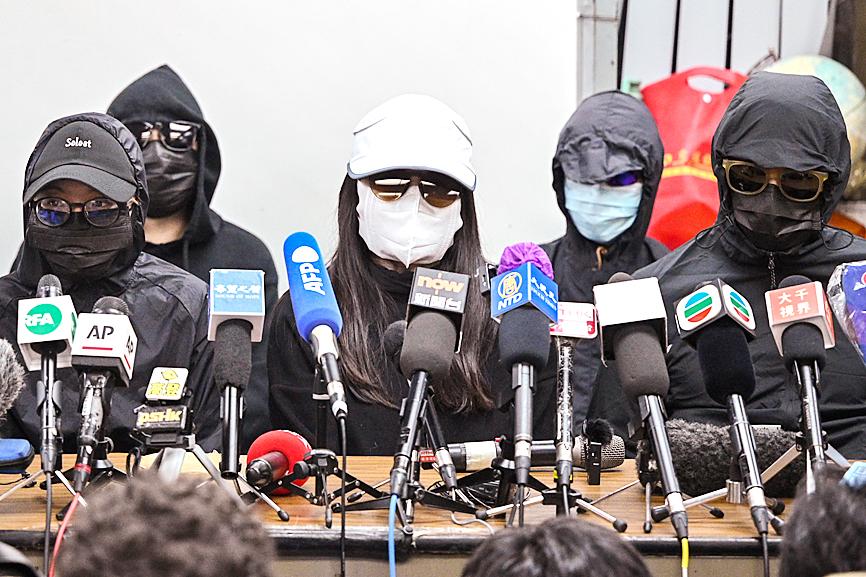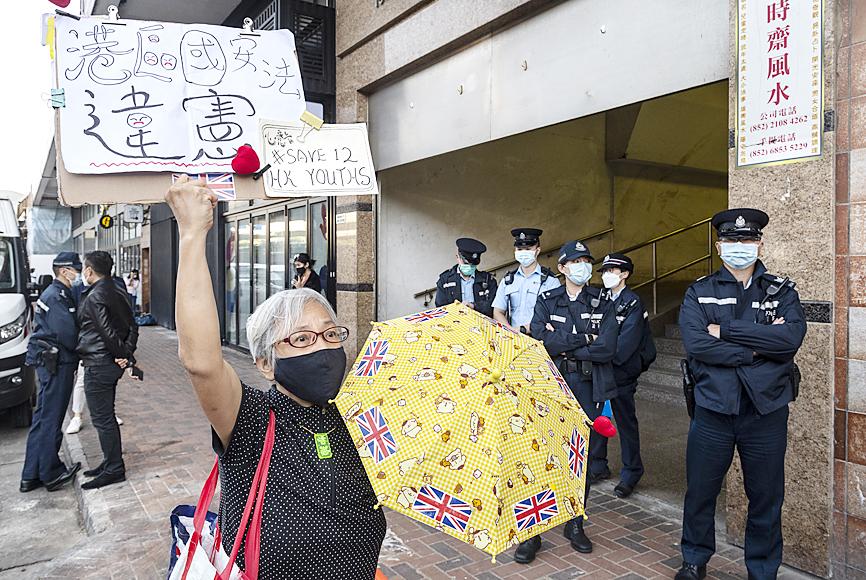Trials for 10 people accused of attempting to flee Hong Kong by speedboat for Taiwan amid a government crackdown on dissent got under way in China yesterday, a court official said.
The defendants face charges of illegally crossing the border, while two face additional charges of organizing the attempt, according to an indictment issued in Shenzhen.
A spokesperson for the Yantian District People’s Court in Shenzhen said that the trials began yesterday afternoon as scheduled.

Photo: AFP
The spokesperson declined to give her name, as is usual among Chinese court officials.
The families of seven of those charged received telephone calls from their court-appointed lawyers saying trials would begin yesterday, a member of the 12 Hongkongers Concern Group told reporters.
The families had called for the hearing in the Shenzhen court to be broadcast live, after they were unable to attend due to the short notice for the trial and COVID-19 quarantine requirements.

Photo: EPA-EFE
They were only notified of the trial date on Friday, while their lawyers have been barred from meeting with the detainees. Chinese authorities instead appointed state-approved legal representation.
Asked about the case, Chinese Ministry of Foreign Affairs spokesman Zhao Lijian (趙立堅) said it was “currently being processed,” but did not confirm the trial had begun.
“The people concerned are suspected of illegally crossing or organizing others to cross the border and are being prosecuted according to the law,” Zhao told reporters at a daily briefing in Beijing.
He dismissed a US embassy statement on the case as interference in China’s “judicial sovereignty.”
Separate hearings were expected for two minors who were also aboard the boat that was apparently heading for Taiwan when it was stopped by the Chinese coast guard on Aug. 23. One is just 16.
Relatives of the 12 have said that the accusations against them are politically motivated.
In a joint letter over the weekend, the families said they “strongly condemn” the authorities’ decision to hold the trial in “de facto secret” at Yantian District People’s Court.
“We urge governments to send embassy personnel to the hearing to guarantee a proper and fair trial by the courts in Shenzhen,” they said, noting that those detained include British, Portuguese and Vietnamese nationals.
The defendants can be sentenced to up to a year in prison for crossing the border and seven years for organizing the trip.
They were picked up after entering mainland Chinese waters for crossing the maritime border without permission.
Amnesty International Hong Kong program manager Lam Cho Ming (林祖明) said in a statement that the group doubted the trials would be fair since defendants had been denied basic rights such as the ability to hire legal representation of their own choosing.
“China must guarantee that all 10 people whose case is set to be heard today, as well as the two others detained with them, get fair and public hearings,” Lam said. “They must also ensure that none of the 12 are subjected to torture or other ill-treatment.”
Amnesty said that the defendants were joining in the hearing by video link, apparently due to COVID-19 concerns, and that family members could not attend because of a required two-week quarantine period.
China has a history of putting dissidents on trial around the Christmas and New Year period to avoid Western scrutiny.
Additional reporting by AFP

AGING: As of last month, people aged 65 or older accounted for 20.06 percent of the total population and the number of couples who got married fell by 18,685 from 2024 Taiwan has surpassed South Korea as the country least willing to have children, with an annual crude birthrate of 4.62 per 1,000 people, Ministry of the Interior data showed yesterday. The nation was previously ranked the second-lowest country in terms of total fertility rate, or the average number of children a woman has in her lifetime. However, South Korea’s fertility rate began to recover from 2023, with total fertility rate rising from 0.72 and estimated to reach 0.82 to 0.85 by last year, and the crude birthrate projected at 6.7 per 1,000 people. Japan’s crude birthrate was projected to fall below six,

Conflict with Taiwan could leave China with “massive economic disruption, catastrophic military losses, significant social unrest, and devastating sanctions,” a US think tank said in a report released on Monday. The German Marshall Fund released a report titled If China Attacks Taiwan: The Consequences for China of “Minor Conflict” and “Major War” Scenarios. The report details the “massive” economic, military, social and international costs to China in the event of a minor conflict or major war with Taiwan, estimating that the Chinese People’s Liberation Army (PLA) could sustain losses of more than half of its active-duty ground forces, including 100,000 troops. Understanding Chinese

US President Donald Trump in an interview with the New York Times published on Thursday said that “it’s up to” Chinese President Xi Jinping (習近平) what China does on Taiwan, but that he would be “very unhappy” with a change in the “status quo.” “He [Xi] considers it to be a part of China, and that’s up to him what he’s going to be doing, but I’ve expressed to him that I would be very unhappy if he did that, and I don’t think he’ll do that. I hope he doesn’t do that,” Trump said. Trump made the comments in the context

SELF-DEFENSE: Tokyo has accelerated its spending goal and its defense minister said the nation needs to discuss whether it should develop nuclear-powered submarines China is ramping up objections to what it sees as Japan’s desire to acquire nuclear weapons, despite Tokyo’s longstanding renunciation of such arms, deepening another fissure in the two neighbors’ increasingly tense ties. In what appears to be a concerted effort, China’s foreign and defense ministries issued statements on Thursday condemning alleged remilitarism efforts by Tokyo. The remarks came as two of the country’s top think tanks jointly issued a 29-page report framing actions by “right-wing forces” in Japan as posing a “serious threat” to world peace. While that report did not define “right-wing forces,” the Chinese Ministry of Foreign Affairs was